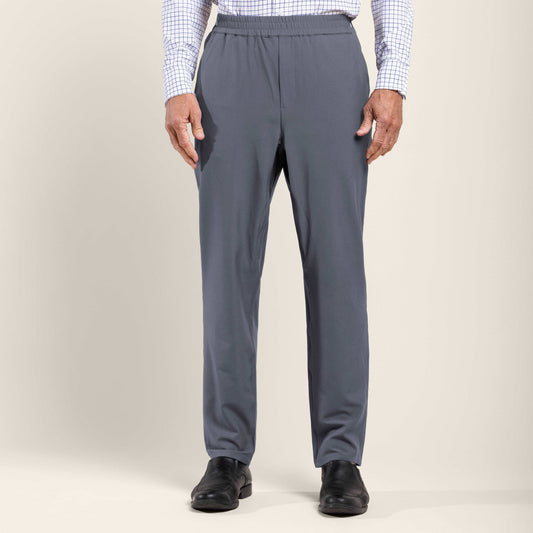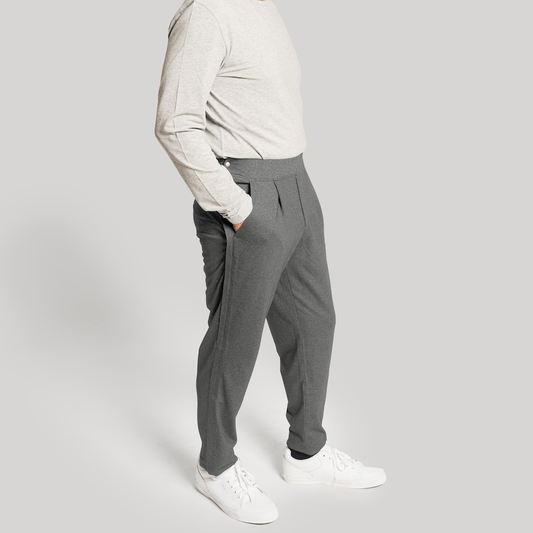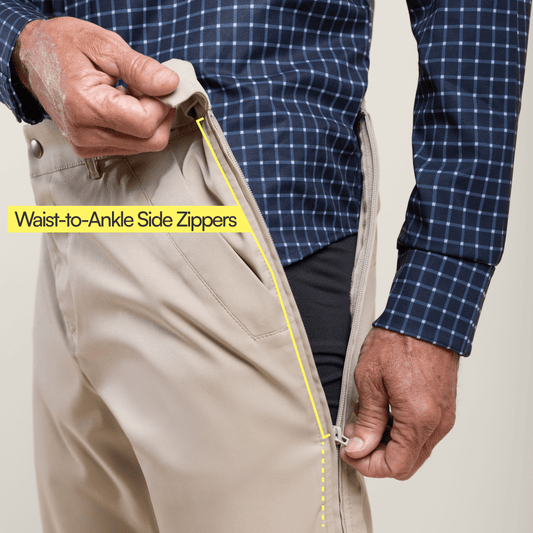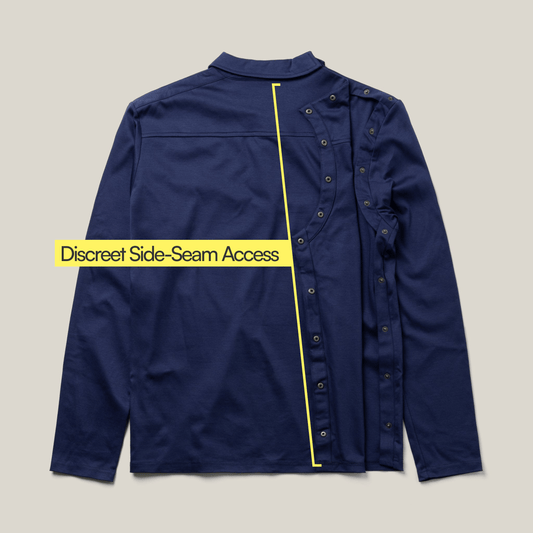Aging often leads to changes in mobility, strength, and coordination. These changes can make daily tasks more difficult and increase the risk of injury. However, the right disability aids can reduce these challenges and support a safer, more comfortable home environment.
Home aids for elderly individuals are designed to assist with everyday tasks while promoting safety and confidence. Whether someone is dealing with limited mobility, recovering from surgery, or needing minimal support, the right tools can make a meaningful difference.
At Joe & Bella, we offer a variety of adaptive clothing for seniors that pairs well with other daily living aids to support independent living. These combined solutions help older adults maintain their routines with greater ease and comfort.
Disability aids for the elderly come in many forms, each designed to support daily activities and independent living. These tools help manage physical limitations and reduce the risk of injury.
By choosing the right home aids for elderly individuals, caregivers can build a safer, more comfortable home environment. From mobility aids for seniors to supportive tools for personal care, these essential tools can improve quality of life.
Below are ten must-have aids that promote independence and well-being:
Adaptive Clothing as Disability Aids
Adaptive clothing is a key category of disability aids that promotes independence in daily life. These garments use magnetic closures, Velcro, and stretchable fabric to simplify dressing.
They are ideal for elderly individuals with limited mobility, limited hand strength, or who require minimal effort when getting dressed.
Styles vary across needs and preferences. Men’s button-down shirts and polos are available for those who want familiar, easy-to-wear tops.
For women, options like cardigans for older ladies and blouses offer both style and ease. Adaptive pants for men and incontinence pants for women also help accommodate medical needs.
Additional products include clothing for nephrostomy bags, compression socks, and grip socks. You can find more options in our adaptive clothing for disabled adults and clothing for limited mobility collections.
1. Daily Living Aids
Daily living aids are essential for supporting older adults in performing routine tasks. These tools help reduce reliance on caregivers and enable seniors to complete daily activities with greater ease.
For example, adaptive utensils with built-up handles help those with arthritis or limited hand strength eat more comfortably. These utensils are easier to grip and require minimal effort to use.
Button hooks, long-handled shoe horns, and thigh lifters help with dressing and movement, reducing strain on joints and improving independence. Living aids like jar openers, key turners, and writing tools can also assist with tasks that require dexterity or grip strength.
These aids for the elderly at home are especially helpful for those experiencing limited mobility or significant mobility limitations.
By making small changes with the right assistive devices, older loved ones can stay independent longer and enjoy a safer, more manageable home environment that supports their health and well-being.
2. Mobility Aids
Mobility aids offer essential support for seniors with balance issues or difficulty walking. These tools are designed to reduce the risk of injury and help individuals move around their homes or communities safely.
Walking aids like canes, walkers, and wheelchairs accommodate various mobility levels, from those needing minimal support to individuals with significant mobility limitations.
Walkers provide four points of contact with the ground, offering superior stability. Many come with wheels, seats, or baskets, making them convenient for longer outings.
Meanwhile, rollators are a specific type of walker equipped with a seat and brakes, which allow users to rest when needed.
Canes are lightweight and easy to maneuver, so they are often chosen by seniors with mild mobility concerns. For those with severe limitations, wheelchairs allow for comfortable transport, both indoors and outdoors.
These elderly mobility aids help preserve independence and allow seniors to continue participating in social activities with greater ease and comfort.
3. Bathroom Safety Aids
The bathroom is a high-risk area for older adults, especially those with limited mobility or balance problems.
Installing proper bathroom safety aids helps create a safer environment and significantly reduces the risk of slips and injuries. Key tools include grab bars, raised toilet seats, and shower chairs.
Grab bars are essential aids that offer stable handholds near the toilet, shower, or bathtub. They help seniors move securely and prevent sudden falls.
Raised toilet seats also reduce the amount of bending needed to sit or stand, minimizing strain on knees and hips. These are ideal for seniors recovering from surgery or those with joint issues.
Shower chairs are another important addition. They allow elderly individuals to bathe while seated, reducing fatigue and eliminating the need to stand for long periods on slippery surfaces.
Combined, these disability aids enhance personal care, maintain dignity, and help seniors bathe safely with minimal effort.
4. Bedroom Aids
Bedroom aids are critical for ensuring comfort and safety in one of the most-used areas of the home. As seniors spend more time in bed—whether for rest or recovery—having the right tools in place makes a major difference.
Common aids for the elderly at home in the bedroom include bed rails, adjustable beds, and supportive mattresses.
Bed rails offer physical support for getting in and out of bed. They also serve as protective barriers for seniors who may be at risk of rolling out during sleep. These aids provide stability and peace of mind for both seniors and caregivers.
Adjustable beds allow users to elevate their legs, head, or entire body, which helps relieve pressure points, improve circulation, and ease conditions like sleep apnea or acid reflux.
These beds are ideal for elderly individuals who require minimal effort to shift positions during sleep, making them one of the most essential tools in the bedroom for aging at home.
5. Hearing and Vision Aids
Hearing and vision aids can greatly impact seniors' daily lives, particularly their communication and staying connected.
Sensory impairments are common in older adults and often contribute to social isolation, frustration, and a decline in cognitive stimulation. However, with the right disability aids, these challenges can be significantly reduced.
Hearing aids are essential for those with hearing loss. These aids improve sound clarity, allowing users to enjoy conversations, music, or television without straining.
Staying engaged through improved hearing also supports mental health and reduces the risk of developing conditions like dementia.
For vision, reading glasses and magnifying glasses help seniors read books, medication labels, and menus. These aids for the elderly help prevent eye strain and support daily tasks like bill-paying or note-taking.
6. Home Automation and Assistive Technology
Home automation and assistive technology provide seniors with greater control over their home environment. These innovations help simplify daily life for those with limited mobility or cognitive challenges.
Smart home devices such as voice-controlled thermostats, automated lights, and electronic locks enable older adults to stay comfortable and safe without constant caregiver support. These tools are particularly useful for those who have difficulty moving or who live alone.
Medical alert systems are critical for emergencies—many feature fall detection and GPS tracking, providing quick access to help when needed.
Caregiver platforms also allow families to coordinate tasks, track medication schedules, and monitor health data. These mobility aids for seniors and aids for the elderly at home combine comfort with peace of mind for everyone involved.
7. Voice-Controlled Assistive Devices
Voice-controlled assistive devices help seniors manage daily tasks more efficiently without relying on touch or movement. These tools are invaluable for those with limited mobility, arthritis, or other challenges that make it difficult to operate standard devices.
Smart speakers equipped with voice assistants can respond to simple spoken commands. Seniors can set reminders, check the weather, play music, or make phone calls.
These features help maintain routines, enhance safety, and promote engagement with the outside world.
Voice-controlled home assistants also integrate with other smart devices, making it possible to control lights, door locks, and thermostats hands-free.
This ease of access supports independent living, especially for seniors who need minimal support but still benefit from occasional assistance.
8. Reaching Aids
Reaching aids are practical mobility aids designed to reduce physical strain and improve independent living for seniors. These tools are ideal for individuals with limited mobility, arthritis, or conditions that make bending or stretching difficult.
A common reaching aid is the grabber or reacher. These tools have long handles and gripping mechanisms that make it easy to retrieve objects from the floor, shelf, or behind furniture.
These aids allow seniors to pick up dropped items, grab cans from high shelves, or pull curtains closed without assistance.
Using a reaching aid reduces the need for risky movements, such as climbing or bending over, which can prevent falls and other injuries.
These assistive devices help seniors stay more independent in their home environment by simplifying access to essential items during daily tasks.
9. Dressing Aids
Dressing aids are simple yet effective tools that help elderly individuals maintain their personal appearance without help. These tools reduce the frustration that can come with dressing while preserving independence and dignity.
Common options include button hooks, which help fasten shirts, and zipper pulls, which assist with jackets or pants. Seniors with limited hand strength or arthritis often struggle with small fasteners, making these tools vital.
Other dressing aids include long-handled shoe horns to assist with putting on shoes without bending. You can also explore sock aids for seniors, which make it easier to wear socks independently.
These aids play an important role in supporting personal care, reducing the physical effort required to dress, and boosting confidence in daily life.
10. Non-Slip Mats and Rugs
Non-slip mats and rugs are critical safety aids for minimizing fall risk in high-traffic areas like bathrooms, kitchens, and hallways. Slipping is one of the leading causes of injury among elderly individuals, making fall prevention a top priority in any home environment.
Non-slip mats provide grip in wet spaces, especially in the bathroom. Placing them near sinks, showers, and tubs creates a safer environment for seniors to move comfortably and confidently.
Non-slip rugs are also helpful in areas with hardwood or tile flooring. Unlike regular rugs, they stay firmly in place and help improve stability while walking.
These aids for the elderly at home are simple yet effective additions to any living space. They are easy to install, require no training to use, and immediately enhance the safety of the home, especially for seniors with mobility issues or those recovering from surgery.
Tips To Choose the Right Home Aid
Choosing the right home aids for elderly individuals requires careful planning. Every senior has different needs, so it is important to focus on both function and comfort. Below are key tips to help guide your decision:
- Understand their specific challenges: Determine whether they need help with movement, dressing, bathing, or other daily activities. Conditions such as arthritis or memory loss may require tailored tools. Consider resources like this guide on clothing for disabled seniors.
- Seek expert guidance: Consult an occupational or physical therapist to match mobility aids, disability aids, or personal care tools to the individual's abilities.
- Test products when possible: Try out aids before purchasing. Items like walkers or shower chairs should fit comfortably and suit the user’s strength and height.
- Keep it simple: Choose devices that are intuitive, especially for those with limited mobility or cognitive impairments.
- Match gifts to real needs: Consider exploring thoughtful items from Joe & Bella’s collections of gifts for dad, gifts for mom, and gifts for elderly, or find gift ideas for osteoarthritis patients, Alzheimer’s support gifts, or gifts for hospital patients.
- Evaluate home layout: Make sure aids like folding canes, grab bars, or mobility scooters can be used safely in tight spaces or on different surfaces.
- Prioritize durability and safety: High-quality materials offer more stability, support, and long-term use, especially when choosing assistive devices used daily.
Enjoy Quality Home Aids and Adaptive Clothing
Supporting elderly individuals with the right home aids and adaptive clothing can make everyday routines easier, safer, and more comfortable. These tools are designed to meet a variety of specific needs, from enhancing mobility to simplifying personal care.
Whether your loved one requires assistance with daily tasks or needs help maintaining stability, having the right aids in place promotes confidence and reduces the risk of injury.
At Joe & Bella, we offer a wide selection of thoughtfully designed aids for the elderly at home. Explore our collections to find solutions that support both independence and dignity.
Sources
- Exercise, Mobility and Aging
- Adaptive Apparel for People With Disabilities: A Systematic Literature Review and Future Research Agenda
- Geriatric Bathroom Design to Minimize Risk of Falling for Older Adults–a Systematic Review
- Sensory Impairments and Cognitive Decline in Older Adults: A Review From a Population-Based Perspective
Joe & Bella's Adaptive Apparel Collections:
Men's Adaptive Clothing | Women's Adaptive Clothing | Men's Adaptive Shirts | Women’s Adaptive Shirts | Men's Adaptive Pants | Women’s Adaptive Pants | Gripper Socks | Side Zipper Pants | Compression Socks | Best Adaptive Clothing | Adaptive Apparel

























































